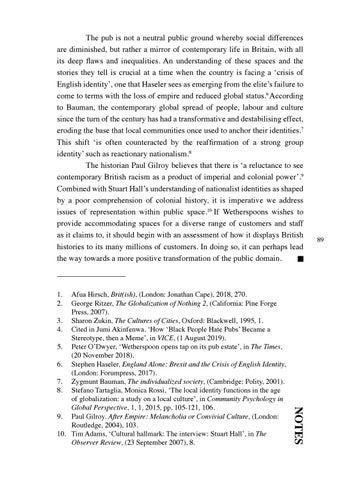The pub is not a neutral public ground whereby social differences are diminished, but rather a mirror of contemporary life in Britain, with all its deep flaws and inequalities. An understanding of these spaces and the stories they tell is crucial at a time when the country is facing a ‘crisis of English identity’, one that Haseler sees as emerging from the elite’s failure to come to terms with the loss of empire and reduced global status.6 According to Bauman, the contemporary global spread of people, labour and culture since the turn of the century has had a transformative and destabilising effect, eroding the base that local communities once used to anchor their identities.7 This shift ‘is often counteracted by the reaffirmation of a strong group identity’ such as reactionary nationalism.8 The historian Paul Gilroy believes that there is ‘a reluctance to see contemporary British racism as a product of imperial and colonial power’.9 Combined with Stuart Hall’s understanding of nationalist identities as shaped by a poor comprehension of colonial history, it is imperative we address issues of representation within public space.10 If Wetherspoons wishes to provide accommodating spaces for a diverse range of customers and staff as it claims to, it should begin with an assessment of how it displays British histories to its many millions of customers. In doing so, it can perhaps lead the way towards a more positive transformation of the public domain.
1. 2.
NOTES
Afua Hirsch, Brit(ish), (London: Jonathan Cape), 2018, 270. George Ritzer, The Globalization of Nothing 2, (California: Pine Forge Press, 2007). 3. Sharon Zukin, The Cultures of Cities, Oxford: Blackwell, 1995, 1. 4. Cited in Jumi Akinfenwa. ‘How ‘Black People Hate Pubs’ Became a Stereotype, then a Meme’, in VICE, (1 August 2019). 5. Peter O’Dwyer, ‘Wetherspoon opens tap on its pub estate’, in The Times, (20 November 2018). 6. Stephen Haseler, England Alone: Brexit and the Crisis of English Identity, (London: Forumpress, 2017). 7. Zygmunt Bauman, The individualized society, (Cambridge: Polity, 2001). 8. Stefano Tartaglia, Monica Rossi, ‘The local identity functions in the age of globalization: a study on a local culture’, in Community Psychology in Global Perspective, 1, 1, 2015, pp. 105-121, 106. 9. Paul Gilroy. After Empire: Melancholia or Convivial Culture, (London: Routledge, 2004), 103. 10. Tim Adams, ‘Cultural hallmark: The interview: Stuart Hall’, in The Observer Review, (23 September 2007), 8.
89
